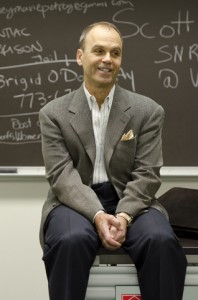 Scott Turow, noted author and attorney, believes that more states will follow Illinois’ lead in eliminating the death penalty.
Scott Turow, noted author and attorney, believes that more states will follow Illinois’ lead in eliminating the death penalty.
Since January 2000 when Illinois’ moratorium went into effect, “the world hasn’t collapsed, but something of a miracle and a slow tireless campaign” has begun, Turow said.
New York, New Jersey and New Mexico have done away with the death penalty. Support for the death penalty is eroding slowly, and he predicts the American people will come to realize there is no need for the death penalty.
Turow, who spoke to the Restorative Justice class at The John Marshall Law School, served on the 14-member Commission on Capital Punishment at the behest of Illinois Governor George Ryan, who declared the nation’s first moratorium on executions.
Turow says when he was invited to be part of the commission, “I told the governor I was a death penalty agnostic, and asked if he would allow me to think through the issues.”
Turow admits that he has held a variety of positions on the death penalty. “I never criticize anyone’s opinion because I’ve held them all,” he stresses. In college he thought the death penalty was barbaric. As an attorney he’s been both for and against the death penalty.
As an assistant United States attorney, he recalled a state case of a murder at Great Lakes. Because it was an offense on federal property, the person was automatically up for the death penalty. It got him thinking: “Could I ask the jury to put him to death?” As a prosecutor, he said the answer was “yes.”
But after he moved to private practice at Sonnenschien Nath & Rosenthal and had great success as an author, including the 1987 hit “Presumed Innocent,” Turow turned his attention to pro bono work “to do the kind of things young lawyers want to do.”
It was during his time representing defendants at the Criminal Court Division of the Circuit Court of Cook County, and others on appeal, that he came to see a criminal justice system that in many ways was broken. In the 1990s, “one in 10 crimes in Chicago was at Robert Taylor (public housing project), so I saw a lot of what I didn’t know much about. I got a big dose of reality and saw a lot more people caught up in the system. I was just one soldier in a large battalion. There are so many attorneys who gave so much time.”
His list of cases included an innocent man fingered for arson, a man wrongly indicted when police mistook him for his brother, and a case on appeal that sent someone to prison because of poor lawyering. With every miscarriage of justice, he began questioning how well justice was being administered.
With that background, Turow agreed to work on the Commission on Capital Punishment. During the months of review, Turow argues no public body worked harder and more diligently in trying to assess the purpose of the death penalty and its impact on Illinois crime. The governor told the commission members it was “a chance to do the right thing.”
Turow said the governor never forgot the one death warrant he had signed. It especially bothered him after two innocent men, Rolando Cruz and Alejandro Hernandez, were on death row and then exonerated for the death of Jeanine Nacarico.
Turow’s part in the study was an examination of deterrence: was the death penalty really affecting murderers in their criminal acts. That premise, Turow found, “flies in the face of reason. There is no meaningful correlation between murder and the death penalty.”
Most young perpetrators commit acts of violence on impulse. “They are devoid of empathy and kill impulsively. Statistics bear that out,” he stressed.
Many people point to Texas, a state that since 1976 has executed more prisoners on death row than any other state. Turow says it’s obvious the death penalty is not a deterrence factor in Texas. The state has a higher murder rate than the national average.
There are those who say the death penalty satisfies the victims’ families, but Turow believes that is an emotional answer. It “uses victims as a fig leaf. We should make judgments on whether it (death penalty) is the best position on society.”
And, there are those who argue “it’s just right; the crime is so horrible that for ultimate evil ultimate judgment.” But he has founded repeated instances where the system is full of inaccuracies.
